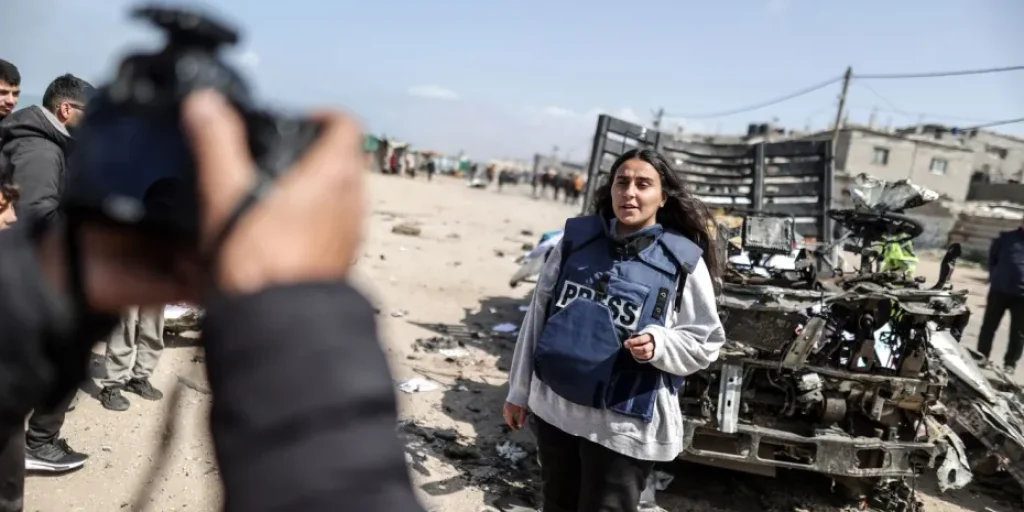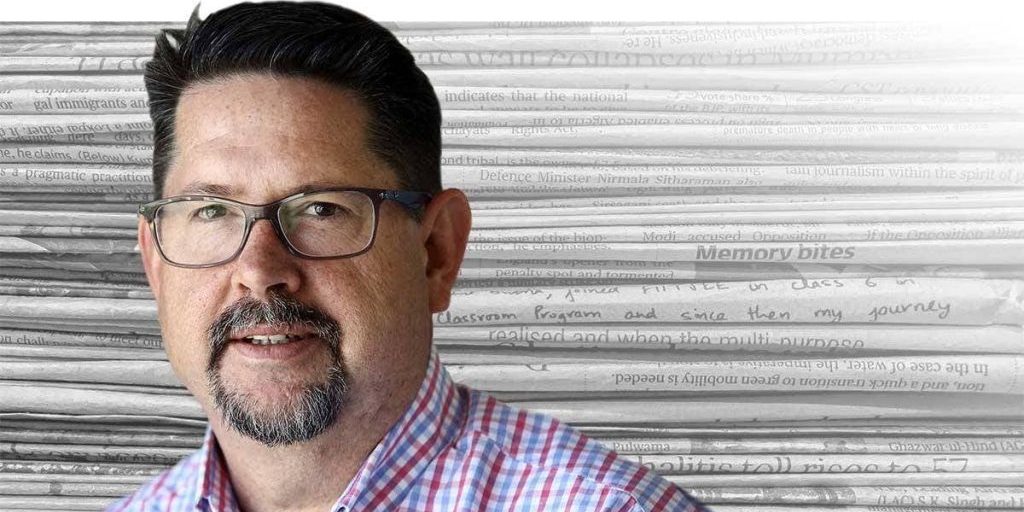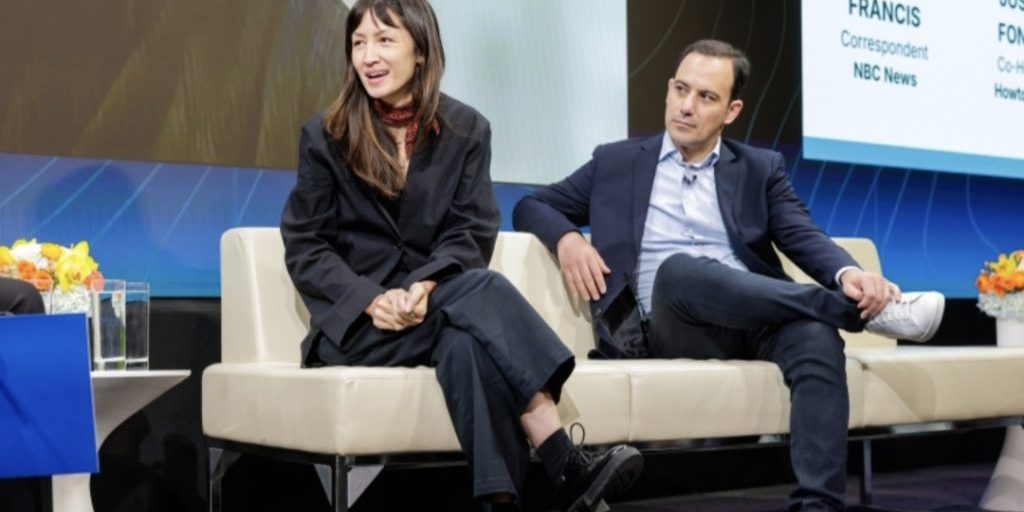‘Murder weapon’: hunger ravages Gaza journalists under Israeli siege
‘What we are witnessing is not only a humanitarian catastrophe, but a direct, unprecedented assault on press freedom, while the world watches,’ said CPJ Regional Director Sara Qudah.
‘Journalists cannot carry out their work – let alone survive – while being deliberately starved and denied life-saving aid. Israel must allow humanitarians, international media, and human rights investigators into Gaza at once.’
Firsthand testimonies from journalists in Gaza offer some insight into the daily horrors that millions of Palestinians are living through.
‘It feels as though your stomach walls are collapsing into each other, and you taste bitterness in your throat, as if the digestive fluids have reached your mouth,’ Al-Natoor wrote on Facebook, detailing what it feels like to experience a ‘hunger attack’
‘A sharp headache strikes the top of your head or a sense of emptiness surrounds your brain. When you try to stand, you feel dizzy and off-balance. You quickly try to support yourself on something and close your eyes for a while, hoping the blood will return to your brain.
‘Our bodies have started to digest themselves, muscle mass is vanishing, and we suffer from extreme emaciation. Hunger is not just a metaphor – it is truly a murder weapon we face every hour,’ he posted.
The journalists who spoke to CPJ said their diet was mainly tinned goods, sometimes supplemented with sporadic supplies of foul-smelling flour, and occasional rotting vegetables.
Even these minimal supplies have become increasingly scarce and unaffordable due to an exorbitant increase in prices.
‘We rely solely on canned food from aid packages – beans, cheese, processed meats that lack sufficient nutritional value. They merely help us break our hunger – not more,’ Al-Natoor told CPJ.
‘Even simple necessities, including canned goods, have become unavailable,’ said Akram Dalloul, a correspondent for the Lebanon-based broadcaster, Al-Mayadeen, whose weight has fallen from 95 to under 80 kilograms during the war.
‘We are talking about a reality that is difficult to describe in words. Often, we cannot stand on our feet,’ said Dalloul, who posted a video on Facebook of himself and his son sharing one raw eggplant as a meal
Mohammad Al-Hajjar, a freelancer contributing to Associated Press and London-based site Middle East Eye, said journalists suffer like everyone else in Gaza.
‘There are no basic food supplies – no flour, sugar, cooking oil, ghee, rice or legumes. We only have a few canned goods and some locally grown vegetables in the southern part of the Strip,’ Al-Hajjar told CPJ from Gaza City. ‘My eight-year-old son Majd suffered from malnutrition and dehydration during the first wave of famine at the start of the war.’
Al-Hajjar is not the only journalist juggling work with finding food for his family.
‘Fruits are non-existent, and some vegetables are available in very limited quantities and are far too expensive,’ said Shrouq Al Alia, director of Ain Media production company, a correspondent for France 24 television network, and the sole parent to a toddler. ‘My daughter often complains of abdominal pain.’
Their poor diet has also caused stomach and colon problems for the 30-year-old, who received CPJ’s 2024 International Press Freedom Award in recognition of her courage in taking over Ain Media after her husband Roshdi Sarraj was killed on 22 October 2023.
‘We face several battles: first, to find flour that is not spoiled and safe for human consumption; second, to afford the soaring prices, and third, to access cash because banks are closed,’ Al Alia said, adding that the cost of a 25kg sack of flour has risen from 25 to 1500 shekels ($7 to $418) or more – an increase of 6 900% – since the war began.
‘This forces us to turn to money exchangers who take a 30% cut on any cash we withdraw,’ said Al Alia, describing the system by which Palestinians transfer their money digitally to middlemen who provide them with cash since banks stopped operating.
And Israel’s blockade on cooking gas remained in place. ‘We rely on wood fire for cooking, which is inefficient and exhausting,’ added Al Aila, whose weight has fallen from 59 to 50kg during the war.
With the import of water purification supplies still prohibited, chronic water scarcity and no way to manage sewage, diarrhea, scabies and skin rashes have proliferated.
‘We’ve been affected by hepatitis as a result of no food, hygiene kits or clean water,’ Majdi Esleem, a 40-year-old Palestinian reporter for the pro-Fatah Al Kofiya TV, told CPJ from Gaza City. ‘Most days we [journalists] work while hungry,’ said the father of five.
‘During work and daily life, I frequently suffer from health problems, including dizziness, difficulty seeing, constant headaches, and weakness,’ said freelance photographer Abd Elhakeem Abu Riash, who contributes to Al Jazeera
‘It is extremely difficult to obtain food or even a single meal … The calories I burn during field journalism are not compensated for due to the scarcity of food.’
The Israel Defence Forces’ North America Media Desk in New York referred CPJ to the Israeli military unit overseeing humanitarian aid, COGAT, which said via email: ‘The IDF, through COGAT, is working to allow and facilitate the transfer of humanitarian aid to the residents of the Gaza Strip, and is also actively supporting these efforts, including by conducting regular monitoring of food stocks within the Strip.’
CPJ emailed the Ministry of Communications and Ministry of Defence requesting comment, but did not receive any responses.
As famine tightens its grip on Gaza, CPJ calls on the international community – particularly the European Union, itself currently reviewing the EU-Israel Association Agreement, and the 50 countries that make up the Media Freedom Coalition – to support the following calls to action:
- Israel and Egypt must allow immediate, unhindered media access to Gaza, so that they may directly cover the hostilities on the ground and related news stories, including starvation and the wider humanitarian toll
- Israel should immediately facilitate access to humanitarian aid to journalists in Gaza and the occupied West Bank. Journalists, like all civilians in Gaza, are struggling to obtain the essentials – such as food, water and sanitary supplies – necessary to live, let alone to report on the reality facing Gazans




